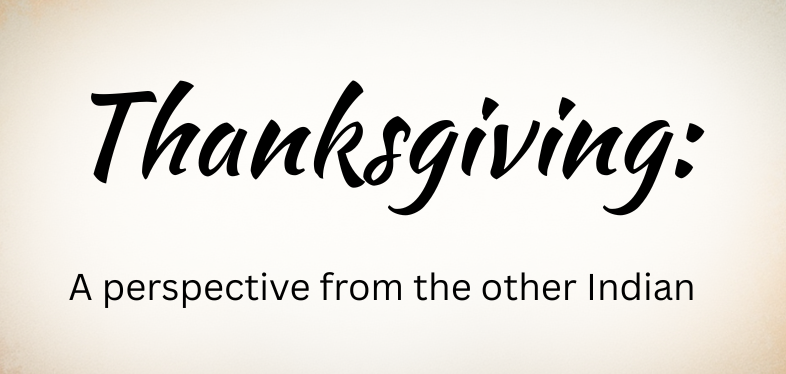Many years ago, a co-worker lamented to me that her daughter refused to celebrate Thanksgiving with her. This co-worker loved Thanksgiving. For her, it was a holiday rooted in gratitude and family bonding. On the other hand, her daughter saw Thanksgiving as a holiday that celebrated settler colonialism and deliberately erased the painful history of Native American genocide.
This divide, often generational, shows up in many families, friend circles, and communities.
How can we celebrate Thanksgiving? Should we celebrate Thanksgiving? Can we preserve everything we hold dear about this cherished tradition in many families while also acknowledging the holiday’s nuanced and troubled history?
As a first-generation immigrant to this country from India, Thanksgiving was not part of my tradition growing up. The first time I attended a “traditional Thanksgiving” was in grad school, when my host family generously invited me and some of my friends to their home. Even though it was over twenty years ago now, my memory of that Thanksgiving is surprisingly clear. I remember my first time trying cranberry sauce, wondering why people like turkey, and asking why a meal eaten midday was called dinner. Since my family does not celebrate Thanksgiving, I have had the opportunity, and freedom, to attend a wide variety of Thanksgiving dinners over the last two decades, mostly with friends and their families. Many immigrants from the Indian diaspora have embraced this holiday and found a way to make it their own, sometimes in an effort to assimilate with the dominant culture.
At the Hunger Intervention Program (HIP), we have served many Thanksgiving meals over the years. In the last few years, we have intentionally shifted away from serving a “traditional” Thanksgiving meal and opted for a Native-American-inspired meal instead. Our team has had lively discussions about the importance of this holiday in people’s lives. As an organization that values building community over a delicious meal, we understand how important a gathering of family and friends can be.
At the same time, we cannot ignore the colonial roots of this tradition and the myths that still surround this holiday. For many Native American peoples, this is a day of mourning. A day that reminds them of the genocide of Native Americans and the whitewashing of their history. We can’t simply ‘move past’ that without some genuine acknowledgment, understanding, and healing. But what will that journey look like? People with deeper knowledge of history and understanding of Thanksgiving traditions have shared their opinions on this topic. There is no one right way to do it. In my opinion, there are three necessary steps we can take to start the process of healing:
(1) Learn and acknowledge history from a Native American perspective. Most of us are taught a sanitized version of the Thanksgiving story from the point of view of the pilgrims. That version does not tell the whole story, and the crucial details it leaves out need to be addressed before we can reimagine this holiday. I’d encourage everyone to seek out unfamiliar perspectives, especially from Native American activists and leaders, and consider them with an open mind. Even among Native American tribes, there is a broad diversity of perspectives.
(2) Once we know better, we must do better. Too often, there is a tendency to quickly acknowledge the wrongs of the past without taking action. It is easy to forget what happened centuries ago and instead focus on all the positive aspects of this holiday. However, in our haste to move beyond an uncomfortable past, we end up dismissing the hurt and the generational trauma that is still very much alive today. Native Americans have a much higher rate of food insecurity, homelessness, health disparities, and many barriers to political representation. We can’t move past a historical trauma without reconciliation and healing. Some options to consider could be incorporating land acknowledgment in your gatherings, supporting native tribes in their struggle for sovereignty, political representation, reparation, and treaty rights.
(3) Finally, find new traditions that align with our new understanding and values. We do not have to give up family/friend gatherings and sharing delicious meals. In fact, we need that more than ever. But not all traditions are worth holding onto. There is freedom and power in giving up parts of old traditions that do not match our values, and finding new ones. What that might look for you or your family, is something you’ll have to decide.
Depending on your traditions, these steps may require more sacrifice for some than others. I don’t have any emotional attachment to this holiday, and no family that expects me to be at their Thanksgiving dinner. It is easier for me to either renounce this holiday or join someone else if I want to. That’s not true for most folks. Everyone has their own story of how they come to understand Thanksgiving and how they want to engage in this tradition. The most important thing is to not get stuck in the same routine, but to take the steps necessary for learning, acting, and finding a new path forward in a way that’s meaningful to you.
What is your story? How are you going to celebrate this holiday, or not? If you are willing to share, I’m all ears.
Recommended readings:
(1) Watch this video of why some Native Americans observe a National Day Of Mourning each Thanksgiving. In this video, Moonanum James of the Aquinnah Wampanoag tribe of Gay Head, shared his perspective of the holiday.
(2) More information on the National Day of Mourning is available on the United American Indians of New England website.
(3) A TIME magazine article by Sean Sherman, CEO of The Sioux Chef, and the author of The Sioux Chef’s Indigenous Kitchen.



